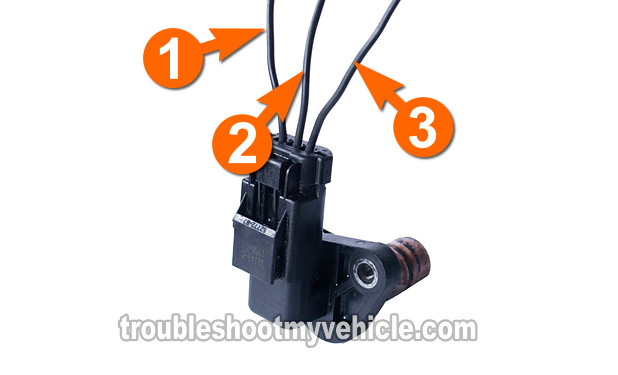TEST 3: Making Sure The CKP Sensor Is Getting Ground

In this test step, you're going to verify that the crankshaft position sensor is getting Ground. As mentioned earlier, the Ground path is completed inside the PCM.
IMPORTANT: You got to be very careful not to short this wire to power (battery voltage) since you run the risk of damaging the PCM. Also, do not use a test light to verify this voltage, use a multimeter.
OK, to get this show on the road, this is what you need to do:
- 1
Place your multimeter in Volts DC mode.
- 2
Disconnect the crankshaft positions sensor from its electrical connector.
- 3
Gently probe the terminal that connects to the wire identified with the number 2 with the black multimeter test lead and an appropriate tool.
- 4
Connect the red multimeter test lead to the battery positive (+) terminal.
- 5
When everything is set up, have your helper turn the key to the On position but don't crank the engine.
- 6
Your multimeter should register 10 to 12 Volts DC.
Lets see what your test result means:
CASE 1: The multimeter registered 10 to 12 Volts DC when the key was turned On. Then the CKP sensor is getting a good Ground.
You can conclude that the crankshaft position (CKP) sensor is bad. Replace the CKP sensor. Here's why: A good working CKP sensor, when it receives power and Ground and the engine is cranking, will generate an ON/OFF 5 Volt signal. Now, in your particular case, in TEST 1 you verified the CKP sensor is not creating its ON/OFF 5 Volt signal. In TEST 2 you confirmed that it's being fed with power (5 or 8 Volts) and in this test step, you have verified that it's getting a good Ground, therefore the CKP sensor is bad. Replace the CKP sensor.
CASE 2: The multimeter DID NOT register 10 to 12 Volts DC when the key was turned On. Recheck your connections and try the test again.
If the multimeter still does not register 12 Volts, then this result lets you know that the CKP is not getting Ground from the PCM. You have now eliminated the crankshaft position sensor as the cause of the no-start condition, since without this Ground, the CKP sensor will not work.
Where To Buy The CKP Sensor And Save
There's a good chance that you can buy the crankshaft position sensor online for a whole lot cheaper than somewhere local.
The following links will help you comparison shop for the crankshaft position sensor:
Not sure if the above crank position sensor fit your particular Dodge (Chrysler/Plymouth)? Don't worry, once you get to the site, they'll make sure it fits by asking you the specifics of your vehicle. If the above don't fit, they'll find the right ones for you.
Related Test Articles
I have written quite a bit about the 2.0L and 2.4L (SOHC and DOHC) ignition systems. You can find all of them here: Chrysler 2.0L, 2.4L Index Of Articles.
Here's a sample of the articles you'll find there:
- How To Test The Camshaft Position Sensor (Chrysler 2.0L, 2.4L).
- How To Test The Engine Compression (Chrysler 2.0L, 2.4L).
- How To Test The Oxygen Sensors (Chrysler 2.0L, 2.4L).
- How To Test The Coil Pack (Chrysler 2.0L, 2.4L) (at: easyautodiagnostics.com.).
- How To Bench Test The Starter Motor (at easyautodiagnostics.com.).

If this info saved the day, buy me a beer!



